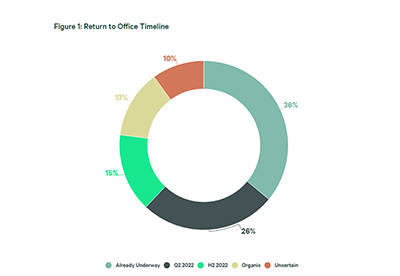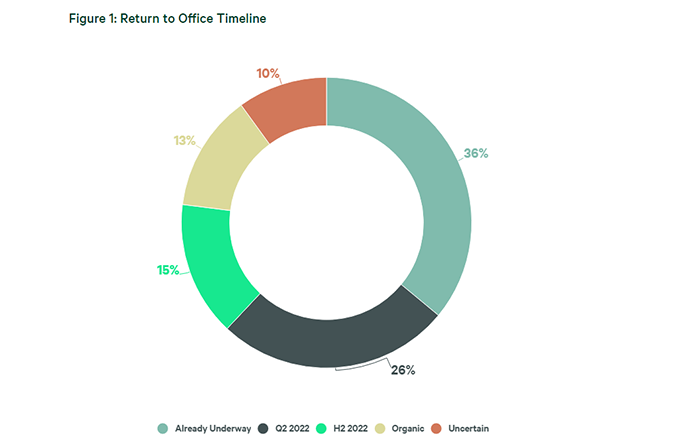
CBRE: Most Companies Anticipate Reshaping Offices for Hybrid Work

CBRE, Dallas, said most office-using companies are developing long-term plans to expand or contract their office space now that employees are returning at least part-time after two years of mostly remote work.
“Companies are moving forward on their real estate plans as their employees gradually return to the office this year, but we need to keep in mind that these types of changes take time to unfold,” said Manish Kashyap, CBRE Global President of Advisory & Transaction Services. “Companies will continue to study their new work patterns and experiment with various ways to support productivity and employee satisfaction.”

The results of those efforts might shift firms’ sentiment on contraction or expansion, Kashyap noted.
“Fewer companies are standing pat,” CBRE said in its U.S. Office Occupier Sentiment Survey. It said companies planning to maintain the same office portfolios for the next three years fell to just 9 percent in the new survey, down from 27 percent in the 2021 survey.
The survey revealed that many companies are at various stages of taking steps to support hybrid work, ranging from changing the size and function of their office portfolios to implementing new in-office technology. For example, 39 percent of companies said they plan to expand their office portfolios over the next three years, mostly due to hiring and business growth. That’s up from 29 percent who said they anticipated expansion a year ago.
Conversely, 52 percent of survey respondents say they intend to reduce their office space over the next three years, mostly to eliminate excess space they anticipate will be freed up by remote work and more efficient use. That’s up from 44 percent in last year’s survey.
Overall, the survey showed that expanders (10-percentage-point gain) are gaining ground on reducers (8-point gain).
One of the primary ways companies are updating their office portfolios to quickly react to changing work practices is by incorporating more flex space, CBRE said. More than half of the companies surveyed said they anticipate flex space will account for a “significant portion” of their office portfolios within two years, up from 17 percent that said it already does today. The survey defines “significant” as one-tenth to one-half of a company’s office space.
CBRE also found that, similar to last year, most companies plan to allow their employees to spend part of their time in the office and part working remotely. Specifically, 73 percent of companies plan to support such hybrid work.
Meanwhile, 19 percent plan to require all work to be done from the office. And only eight percent intend to be “virtual first” or fully remote. What will that mean for day-to-day office attendance? CBRE said 85 percent of companies want employees to spend half or more of their time in the office. The rest anticipate their workforce being primarily remote, but not fully. CBRE economists forecast U.S. workers will spend an average of 3.4 days per workweek in the office going forward, down from 4.4 days a week before the pandemic.
